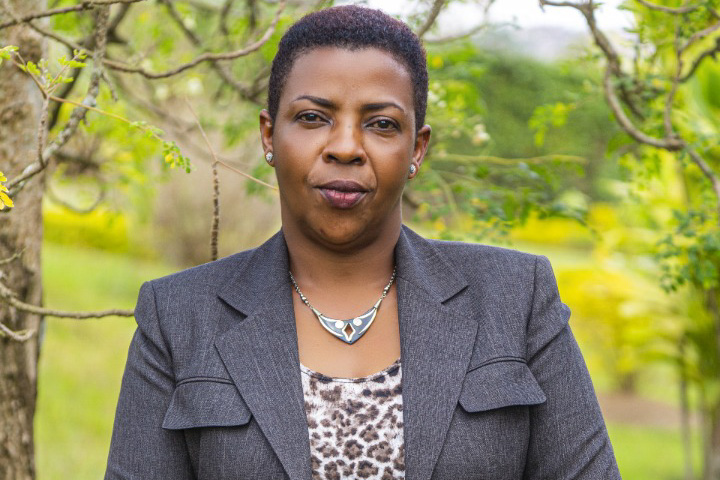Being a partner organisation to Kvinna till Kvinna
What is it like to be a partner organisation to The Kvinna till Kvinna Foundation? We spoke with women human rights defender Egidie Mukarurangwa, from one of our partners in Rwanda, on the topic!

“Working with Kvinna till Kvinna has been a game changer for us. Not only have we been able to conduct our programmes, but we’ve strenghtened the capacity of the organisation as well,” says Egidie Mukarurangwa who is a programme director at Réseau des Femmes Oeuvrant pour le Développement Rural.
We are visiting a refresher workshop by Réseau des Femmes on sexual and reproductive health and rights provided to teen mothers and their parents in Rwamagana District. Réseau des Femmes is one of the eleven partner organisations we support in Rwanda, from our office in Kigali.
“Kvinna till Kvinna’s approach when working with partner is to leave the priorities to us: what do we need? What do we want? Each year they make needs assessment in terms of capacity building for their partners and from that they plan trainings for us,” says Egidie.
Trainings and support for advocacy
Egidie explains that through Kvinna till Kvinna, Réseau des Femmes has, for example, been trained in using media exposure for advocacy and visibility, which has had a lot of positive effects for the organisation.
“Especially since we were so restricted during the pandemic and couldn’t do our normal activities. After the trainings, we started using online communication much more.”
She continues:
“Working with Kvinna till Kvinna has transformed me. I feel empowered from within. I have confidence in myself and want to use the privilege of gaining this knowledge to empower others, in particular the vulnerable girls taking part in our programmes.”
Some of the outcomes she mentions are advocacy for teen mother’s school education and shadow reporting on the Maputo protocol. Both of which was enabled by the support of Kvinna till Kvinna.
Networking with other women’s rights organisations
Another that Egidie wishes to highlight is the opportunity to network with other women’s rights organisations, even from other countries, and share learnings.
“Each year, Kvinna till Kvinna organises a session for their partners where organisations can share their learnings on working with gender-based violence. There, we learned how important safe spaces are for women and girls who are victims of violence. To have a room where a woman in danger can come and sleep, for example. Now, we have one of those safe spaces at our office, here in Rwamagana. We are also able to provide counselling in that space,” Egidie explains.
Sustainable funding
Through the support of Kvinna till Kvinna, and in close collaboration with our focal point at the Kigali office, Réseau des Femmes has developed their organisational capacity.
“We have been able to take time and resources to reflect on how we can improve the organisation in itself, not just the programmes. We have been able to improve our way of working through various new policies and tools for finances and monitoring, which has strenghtened our accountability and credibility,” says Egidie.
This would not have been possible if salary costs for, for example, financial management had not been covered. Edigie says this is a sustainable approach to funding:
“It’s very unique. For many projects, donors will only support certain parts. Sometimes that is only activities and no staff costs. That makes it difficult for us. With Kvinna till Kvinna, we feel secure.”
Attracting new donors
Through the partnership with Kvinna till Kvinna, Réseau des Femmes has rekindled its long-standing reputation in Rwanda after many years of struggling to get funding and support for their work.
“When I joined in 2019, we only had one donor: Kvinna till Kvinna. Now, we have five, including UNDP/RGB and UN Women. Because Kvinna till Kvinna trained us on how to make a good concept note, how to make our work visible and, also, how to conduct better reporting and tell stories from our work through social media. Before, we didn’t know how to target donors. Now, we are being approached by them,” says Egidie.
Kvinna till Kvinna has supported women’s rights in Rwanda since 2017. Together with our partner organisations, we:
- advocate for gender-based violence prevention and support victims with legal and psychosocial aid.
- promote young women’s ownership of sexual and reproductive health choices.
- promote women’s participation in local politics, peace and conflict resolution processes.
- support women with disabilities and advocate for their rights.